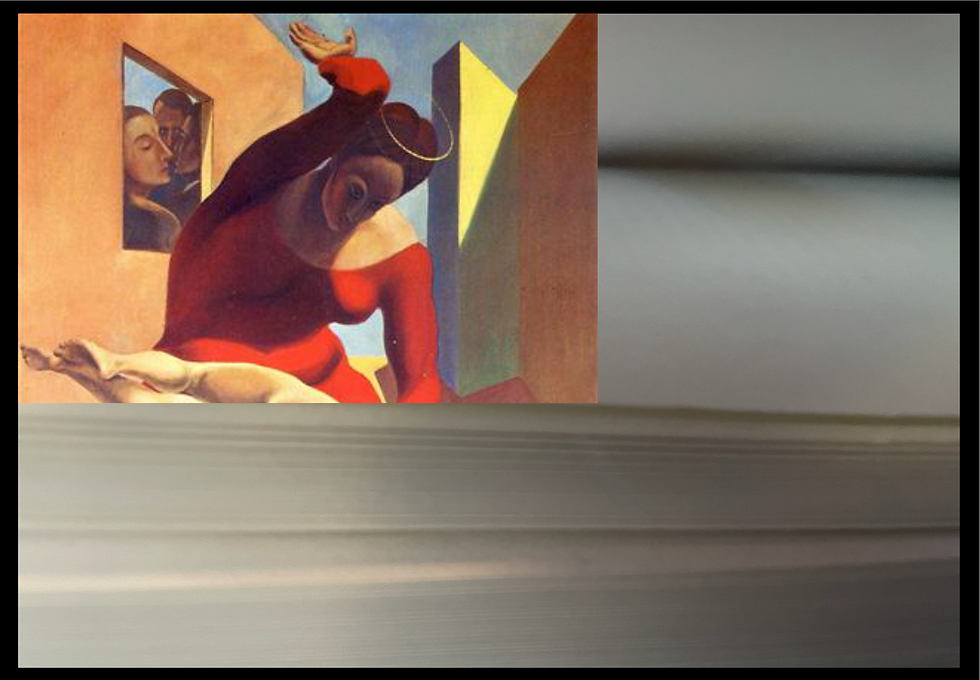Their Vehicles
- yuvalkh
- Jun 25
- 4 min read
Updated: Aug 2
Author: Yuval Klein

As in a previous piece that I’ve linked here (only available in Hebrew), this document is comprised of fictional literary installments that will hopefully accumulate with the ineluctable passing of time. If you’d like to see this project expanded, know that I’m always open to coercion, especially by email.
***
The man in his steel vehicle passed wooden condominiums, office buildings with translucent glass panels, chain stores, corn and soy fields, smug billboards, makeshift trailer parks, and American flags reaching towards him from highway adjacent properties. There was no novelty in these sights–not for this vehicular man, at least–and so he would invariably become introspective in their midst. These drives were akin to dreaming; the monotony of the landscape suffices to compensate for sleep’s requisite darkness, and the thoughts would accordingly become dreamlike, incoherent fragments. After an extended period of vehicular and cerebral drifting, he would reach a steel tipi, its gilded exterior inscribed with the reservation’s name. He arrived at a parking lot filled with vehicular specimens, disparate clusters of them–there were vehicular families, vehicular friends, vehicular lovers, vehicular prostitutes, and so on. All tended to arrive at the casino in the twilight hours, thereafter returning in darkness. The man, too, would return in the hours of darkness, tarrying for a while before acquiescing to the familiar forces of downward social mobility.
In spite of everything, he seldom regrets his bouts in the casino, few of the vehicle-emergent people do, for gambling serves as a necessary means of gamifying life. He likes to employ his hands in the execution of fate, to enact some preposterously grand scheme with his delicate, primate digits. The power of the human hand lies in its ability to extend outwards—it can pull triggers, switch levers, light fuses, point towards enemies so as to direct the violent purpose of a collective, assemble weapons with deft precision, grip knives, salute madmen, stone scapegoats, and derail hefty vehicles; the hand, with its delicate digits, can manipulate the most caustic psychological and physical forces. In awe of their hands, the vehicled masses come to this casino with the fantasy of attaining awesome power by way of a chance cascade—evoked by their dreamy digits, impelled by the wind. Perhaps beyond the curtains through which their hands disappear, a Rube Goldberg machine is laying in wait, with the dominoes and elegant ramps summoned lovingly by a divine creator–they imagine it in all of its triumph for a moment before confronting a space textured with coarse emptiness. The vehicled faces are lit by flashy machinery, their faces expressionless, with hands flailing fiendishly as icons shift before their eyes. As always, silence abounds in the casino.
***
A prominent comedian arrives at the casinoic gates. As he leaves his Volkswagen, he has a vague and accurate premonition that reuniting with this vehicle will prove to be an arduous task given the sheer enormity and undifferentiated expanse of the parking space. He hitches a ride with a man whose occupation is driving a golf cart, hence the comedian’s question: “How long have you been driving this golf cart?” The man, with his hands of steel and head of balding gray, responds, “Thirty-five years.” The comedian responds in turn, “Wow. How do you like it?” Hands steady, hair (of course), “Yeah, well you know” (not formulated as a question). The comedian – rather prominent, and baffled by the apparent hollowness of his interlocutor – asks, “You grow up around here?” Hands, hair, “Nearby–right back in Wanton Peak.” Inquisitively, “As in w-a-n-t-o-n?” Hands paired with hair, “That’d be right.” Deflating a bit with a chuckle, “That’s an ominous name.” The comedian soon became tense again as he noticed the puzzlement on the man’s face. His joke hadn't been registered–he became suffused with an acute terror, the origin of which was opaque to him.
***
A child paces behind her mother, who had left her vehicle unlocked in the midst of her casino-bound haze. It seems that every time the child’s bleary eyes would approach her mother’s bosom, the speed of that hefty maternal object would accelerate. This scene is regrettably evocative of their relationship, the mother and her bosom comprising a shifting, ravishing chimera chased through dreams, streets, alleys, casinos, and oft-circulating memories. There routine normally unfolds as such:
Mother approaches favorite card dealer, turning gaze towards daughter momentarily to offer a ten dollar bill and condemn her from entering the mommy vicinity.
Daughter sulks in the direction of favorite corndog dealer and attempts to salvage the deep-fried treat for a while.
But on this particular day, the child decided to start a hunger strike. She wandered about in the adjacent hotel, greeting a kind prostitute that always acknowledges her by name, and contemplated the latest fantasy series she’d read: a pre-adolescent boy convinces his friends from school to enter an infamous haunted house, only to find themselves stumbling through a portal to a world in which an evil terrorist and his dragon have been ruthlessly assaulting celebrities. Finally, she sees a woman quite like her mother – the selfsame pink veil, eyebrows trimmed to a fault, a bent little nose! Here is your corndog, the luminous woman says kindly – I’ll take you home, if that’s okay. And as though having entered a portal, a new world came to replace the former; a new, happier girl emerged in her place. She recalled a molting snake she had found strewn on her porch – the crispy death from which it emerged, its gaping eyes, the urgency in its mannerisms – and proceeded to slither into that new, hefty maternal vehicle.
***




Comments